Using recycled pallets is an excellent way to reduce the costs associated with transporting products without compromising on quality. At the same time recycling pallets is a more ecologically-sustainable choice that keeps usable pallets out of landfills. However, understanding the grading system used by pallet manufacturers is not always easy, and knowing which products best meet your needs for shipping and displaying goods is essential to making the best purchases for your supply chain.
At first glance, the standards and definitions set forth by the various trade organizations are fairly straightforward. The most common size for pallets used across numerous industries in the North American market is the GMA standard 48”x40”, a standard established by the Grocery Manufacturers Association (GMA). The use of this standard has spread far beyond the grocery industry. Pallets of other dimensions are available for applications that benefit from other size parameters, and Greenway Products & Services offers custom sizes, but the 48”x40” GMA standard has become so widespread that practically any location that handles shipments of goods with forklifts or pallet jacks will easily accept pallets of this size.
The GMA grading system for recycled pallets divides pallets into two general categories, grade A and grade B; a third categorization, grade C, exists but is rarely used, as pallets in this category are reaching the end of their useful life and may not be as sturdy or reliable as those in the other two categories. Because of their uncertain reliability, many pallet manufacturers do not offer grade C pallets for sale at all. Within these two basic categories, manufacturers often divide pallets into multiple sub-classifications determined by finer distinctions in repair and condition, with three or four different names used across the industry to refer to the same subclass.
Grade A Pallets
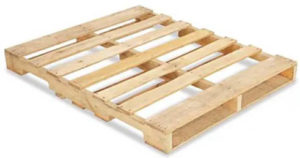 Broadly speaking, a grade A classification means the pallet has not yet needed substantial repairs and looks tidy and new. Specifically, a grade A pallet has not sustained damage to its stringers and do not require repairs with plugs or companion boards. Other types of repairs may be present, however, including the use of cleated metal plates used to reinforce a cracked board and prevent further splitting. Boards reinforced with these metal plates may actually be stronger than their intact counterparts, though the presence of plates is a visible repair that may detract from the appearance of the pallet. Pallets within the grade A category are generally best for display applications in which the pallet will be visible to customers, as these pallets have not required extensive and unsightly repairs.
Broadly speaking, a grade A classification means the pallet has not yet needed substantial repairs and looks tidy and new. Specifically, a grade A pallet has not sustained damage to its stringers and do not require repairs with plugs or companion boards. Other types of repairs may be present, however, including the use of cleated metal plates used to reinforce a cracked board and prevent further splitting. Boards reinforced with these metal plates may actually be stronger than their intact counterparts, though the presence of plates is a visible repair that may detract from the appearance of the pallet. Pallets within the grade A category are generally best for display applications in which the pallet will be visible to customers, as these pallets have not required extensive and unsightly repairs.
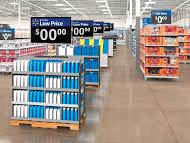
Grade B Pallets
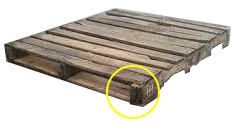 After grade A comes the category of pallets that are just as strong and reliable as other pallets, but the number and type of repairs they required to bring them up to that level of performance also ensured that they won’t be winning any beauty contests. B grade pallets tend to feature repairs to their stringer boards, usually in the form of companion stringers or plugs. In this type of repair, a cracked or broken stringer is braced with another, intact piece of stringer nailed in place alongside it. The bracing piece may be as short as 6” or may run the entire length of the pallet, depending on the nature of the break. When performed properly, this kind of repair is very sturdy and sound. It may also slightly restrict the amount of clearance available for the blades of a forklift or pallet jack. Predictably, B grade pallets also tend to show more superficial discoloration and wear than A grade pallets. Many manufacturers also divide Grade B into subdivisions, generally based around the number of repairs, with Premium B or B1 grade pallets having only one repair per stringer cavity, and Standard B may feature more repairs and damaged deck boards.
After grade A comes the category of pallets that are just as strong and reliable as other pallets, but the number and type of repairs they required to bring them up to that level of performance also ensured that they won’t be winning any beauty contests. B grade pallets tend to feature repairs to their stringer boards, usually in the form of companion stringers or plugs. In this type of repair, a cracked or broken stringer is braced with another, intact piece of stringer nailed in place alongside it. The bracing piece may be as short as 6” or may run the entire length of the pallet, depending on the nature of the break. When performed properly, this kind of repair is very sturdy and sound. It may also slightly restrict the amount of clearance available for the blades of a forklift or pallet jack. Predictably, B grade pallets also tend to show more superficial discoloration and wear than A grade pallets. Many manufacturers also divide Grade B into subdivisions, generally based around the number of repairs, with Premium B or B1 grade pallets having only one repair per stringer cavity, and Standard B may feature more repairs and damaged deck boards.
Greenway Products & Services, LLC is the largest pallet re-manufacturer and recyclers in NY, NJ, PA, MD, and DE. We also accept scrap wood from our customers that we turn into valuable resources. Greenway is a highly-rated, full-service pallet management company. Contact us for a quote today at sales@greenwaypsllc.com. Visit our website, greenwaypsllc.com or call us at 732-442-0200. We can deliver trailers to you on a moment’s notice throughout the NY-NJ-PA-MD-DE area.

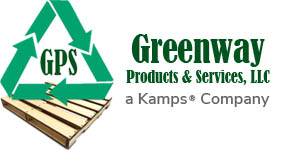

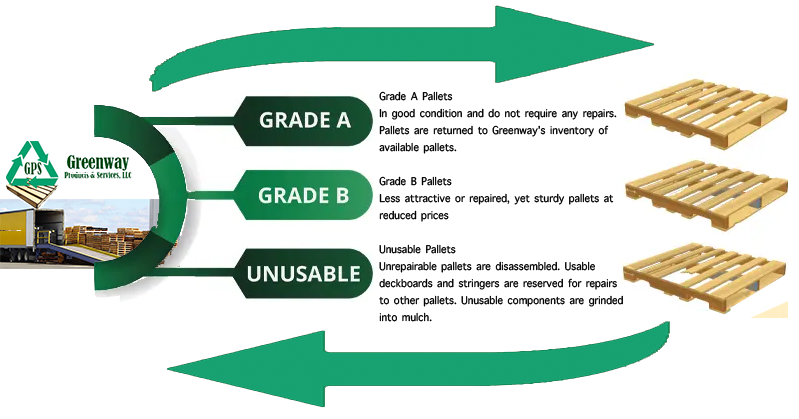

Leave A Comment